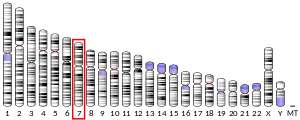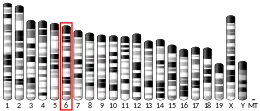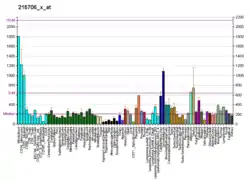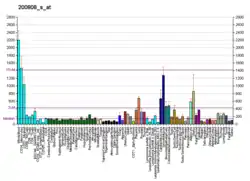Zyxin
Zyxin is a protein that in humans is encoded by the ZYX gene.[5][6][7]
| ZYX | |||||||||||||||||||||||||||||||||||||||||||||||||||
|---|---|---|---|---|---|---|---|---|---|---|---|---|---|---|---|---|---|---|---|---|---|---|---|---|---|---|---|---|---|---|---|---|---|---|---|---|---|---|---|---|---|---|---|---|---|---|---|---|---|---|---|
| Identifiers | |||||||||||||||||||||||||||||||||||||||||||||||||||
| Aliases | ZYX, ESP-2, HED-2, zyxin | ||||||||||||||||||||||||||||||||||||||||||||||||||
| External IDs | OMIM: 602002 MGI: 103072 HomoloGene: 31164 GeneCards: ZYX | ||||||||||||||||||||||||||||||||||||||||||||||||||
| |||||||||||||||||||||||||||||||||||||||||||||||||||
| |||||||||||||||||||||||||||||||||||||||||||||||||||
| |||||||||||||||||||||||||||||||||||||||||||||||||||
| |||||||||||||||||||||||||||||||||||||||||||||||||||
| |||||||||||||||||||||||||||||||||||||||||||||||||||
| Wikidata | |||||||||||||||||||||||||||||||||||||||||||||||||||
| |||||||||||||||||||||||||||||||||||||||||||||||||||
Function
Focal adhesions are actin-rich structures that enable cells to adhere to the extracellular matrix and at which protein complexes involved in signal transduction assemble. Zyxin is a zinc-binding phosphoprotein that concentrates at focal adhesions and along the actin cytoskeleton. Zyxin has an N-terminal proline-rich domain and three LIM domains in its C-terminal half. The proline-rich domain may interact with SH3 domains of proteins involved in signal transduction pathways while the LIM domains are likely involved in protein-protein binding. Zyxin may function as a messenger in the signal transduction pathway that mediates adhesion-stimulated changes in gene expression and may modulate the cytoskeletal organization of actin bundles. Alternative splicing results in multiple transcript variants that encode the same isoform.[7]
Interactions
Zyxin has been shown to interact with:
References
- ENSG00000285443 GRCh38: Ensembl release 89: ENSG00000159840, ENSG00000285443 - Ensembl, May 2017
- GRCm38: Ensembl release 89: ENSMUSG00000029860 - Ensembl, May 2017
- "Human PubMed Reference:". National Center for Biotechnology Information, U.S. National Library of Medicine.
- "Mouse PubMed Reference:". National Center for Biotechnology Information, U.S. National Library of Medicine.
- Zumbrunn J, Trueb B (January 1997). "A zyxin-related protein whose synthesis is reduced in virally transformed fibroblasts". Eur J Biochem. 241 (2): 657–63. doi:10.1111/j.1432-1033.1996.00657.x. PMID 8917469.
- Macalma T, Otte J, Hensler ME, Bockholt SM, Louis HA, Kalff-Suske M, Grzeschik KH, von der Ahe D, Beckerle MC (January 1997). "Molecular characterization of human zyxin". J Biol Chem. 271 (49): 31470–8. doi:10.1074/jbc.271.49.31470. PMID 8940160.
- "Entrez Gene: ZYX zyxin".
- Reinhard M, Zumbrunn J, Jaquemar D, Kuhn M, Walter U, Trueb B (May 1999). "An alpha-actinin binding site of zyxin is essential for subcellular zyxin localization and alpha-actinin recruitment". J. Biol. Chem. 274 (19): 13410–8. doi:10.1074/jbc.274.19.13410. PMID 10224105.
- Li B, Trueb B (September 2001). "Analysis of the alpha-actinin/zyxin interaction". J. Biol. Chem. 276 (36): 33328–35. doi:10.1074/jbc.M100789200. PMID 11423549.
- Tani K, Sato S, Sukezane T, Kojima H, Hirose H, Hanafusa H, Shishido T (June 2003). "Abl interactor 1 promotes tyrosine 296 phosphorylation of mammalian enabled (Mena) by c-Abl kinase". J. Biol. Chem. 278 (24): 21685–92. doi:10.1074/jbc.M301447200. PMID 12672821.
- Drees B, Friederich E, Fradelizi J, Louvard D, Beckerle MC, Golsteyn RM (July 2000). "Characterization of the interaction between zyxin and members of the Ena/vasodilator-stimulated phosphoprotein family of proteins". J. Biol. Chem. 275 (29): 22503–11. doi:10.1074/jbc.M001698200. PMID 10801818.
- Li B, Zhuang L, Trueb B (May 2004). "Zyxin interacts with the SH3 domains of the cytoskeletal proteins LIM-nebulette and Lasp-1". J. Biol. Chem. 279 (19): 20401–10. doi:10.1074/jbc.M310304200. PMID 15004028.
- Hirota T, Morisaki T, Nishiyama Y, Marumoto T, Tada K, Hara T, Masuko N, Inagaki M, Hatakeyama K, Saya H (May 2000). "Zyxin, a regulator of actin filament assembly, targets the mitotic apparatus by interacting with h-warts/LATS1 tumor suppressor". J. Cell Biol. 149 (5): 1073–86. doi:10.1083/jcb.149.5.1073. PMC 2174824. PMID 10831611.
- Harbeck B, Hüttelmaier S, Schluter K, Jockusch BM, Illenberger S (October 2000). "Phosphorylation of the vasodilator-stimulated phosphoprotein regulates its interaction with actin". J. Biol. Chem. 275 (40): 30817–25. doi:10.1074/jbc.M005066200. PMID 10882740.
Further reading
- Reinhard M, Jouvenal K, Tripier D, Walter U (1995). "Identification, purification, and characterization of a zyxin-related protein that binds the focal adhesion and microfilament protein VASP (vasodilator-stimulated phosphoprotein)". Proc. Natl. Acad. Sci. U.S.A. 92 (17): 7956–60. doi:10.1073/pnas.92.17.7956. PMC 41265. PMID 7644520.
- Wang LF, Miao SY, Zong SD, Bai Y, Koide SS (1995). "Gene encoding a mammalian epididymal protein". Biochem. Mol. Biol. Int. 34 (6): 1131–6. PMID 7696985.
- Hobert O, Schilling JW, Beckerle MC, Ullrich A, Jallal B (1996). "SH3 domain-dependent interaction of the proto-oncogene product Vav with the focal contact protein zyxin". Oncogene. 12 (7): 1577–81. PMID 8622875.
- Kotake K, Ozaki N, Mizuta M, Sekiya S, Inagaki N, Seino S (1997). "Noc2, a putative zinc finger protein involved in exocytosis in endocrine cells". J. Biol. Chem. 272 (47): 29407–10. doi:10.1074/jbc.272.47.29407. PMID 9367993.
- Zumbrunn J, Trueb B (1998). "Assignment of the ZYX gene for the LIM protein zyxin to human chromosome bands 7q34→q35 by in situ hybridization". Cytogenet. Cell Genet. 81 (3–4): 283–4. doi:10.1159/000015047. PMID 9730620. S2CID 46778049.
- Yang JX, Miao SY, Wu YW, Zhang Z, Zong SD, Wang LF, Koide SS (1998). "Gene encoding a human testis Sertoli cell component related to LIM domain protein". Biochem. Mol. Biol. Int. 46 (1): 11–9. doi:10.1080/15216549800203502. PMID 9784834. S2CID 6735908.
- Reinhard M, Zumbrunn J, Jaquemar D, Kuhn M, Walter U, Trueb B (1999). "An alpha-actinin binding site of zyxin is essential for subcellular zyxin localization and alpha-actinin recruitment". J. Biol. Chem. 274 (19): 13410–8. doi:10.1074/jbc.274.19.13410. PMID 10224105.
- Drees B, Friederich E, Fradelizi J, Louvard D, Beckerle MC, Golsteyn RM (2000). "Characterization of the interaction between zyxin and members of the Ena/vasodilator-stimulated phosphoprotein family of proteins". J. Biol. Chem. 275 (29): 22503–11. doi:10.1074/jbc.M001698200. PMID 10801818.
- Hirota T, Morisaki T, Nishiyama Y, Marumoto T, Tada K, Hara T, Masuko N, Inagaki M, Hatakeyama K, Saya H (2000). "Zyxin, a Regulator of Actin Filament Assembly, Targets the Mitotic Apparatus by Interacting with H-Warts/Lats1 Tumor Suppressor". J. Cell Biol. 149 (5): 1073–86. doi:10.1083/jcb.149.5.1073. PMC 2174824. PMID 10831611.
- Smolenski A, Poller W, Walter U, Lohmann SM (2000). "Regulation of human endothelial cell focal adhesion sites and migration by cGMP-dependent protein kinase I". J. Biol. Chem. 275 (33): 25723–32. doi:10.1074/jbc.M909632199. PMID 10851246.
- Harbeck B, Hüttelmaier S, Schluter K, Jockusch BM, Illenberger S (2000). "Phosphorylation of the vasodilator-stimulated phosphoprotein regulates its interaction with actin". J. Biol. Chem. 275 (40): 30817–25. doi:10.1074/jbc.M005066200. PMID 10882740.
- Schenker T, Trueb B (2000). "BSPRY, a novel protein of the Ro-Ret family". Biochim. Biophys. Acta. 1493 (1–2): 255–8. doi:10.1016/s0167-4781(00)00167-6. PMID 10978534.
- Li B, Trueb B (2001). "Analysis of the alpha-actinin/zyxin interaction". J. Biol. Chem. 276 (36): 33328–35. doi:10.1074/jbc.M100789200. PMID 11423549.
- Degenhardt YY, Silverstein S (2001). "Interaction of Zyxin, a Focal Adhesion Protein, with the E6 Protein from Human Papillomavirus Type 6 Results in Its Nuclear Translocation". J. Virol. 75 (23): 11791–802. doi:10.1128/JVI.75.23.11791-11802.2001. PMC 114765. PMID 11689660.
- Yi J, Kloeker S, Jensen CC, Bockholt S, Honda H, Hirai H, Beckerle MC (2002). "Members of the Zyxin family of LIM proteins interact with members of the p130Cas family of signal transducers". J. Biol. Chem. 277 (11): 9580–9. doi:10.1074/jbc.M106922200. PMID 11782456.
- van der Gaag EJ, Leccia MT, Dekker SK, Jalbert NL, Amodeo DM, Byers HR (2002). "Role of zyxin in differential cell spreading and proliferation of melanoma cells and melanocytes". J. Invest. Dermatol. 118 (2): 246–54. doi:10.1046/j.0022-202x.2001.01657.x. PMID 11841540.
External links
- Zyxin Info with links in the Cell Migration Gateway Archived 2014-12-11 at the Wayback Machine





